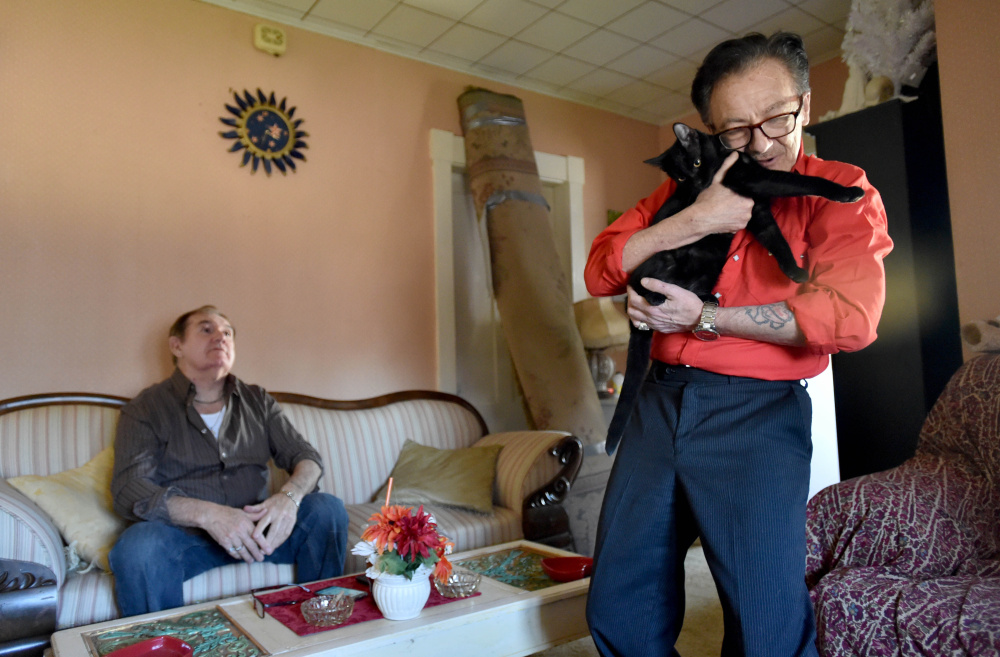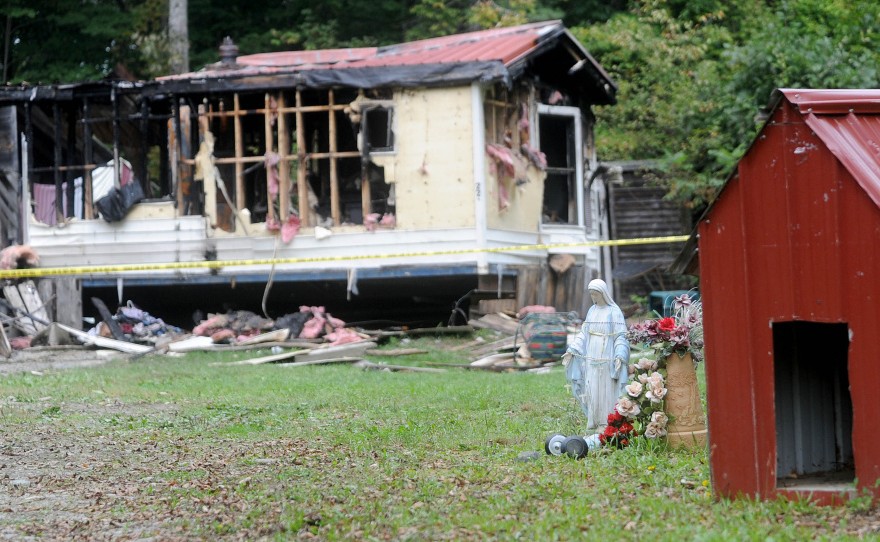A Canaan man has pleaded guilty to setting his neighbors’ house on fire and killing their seven pets in a September blaze, but the victims say they don’t believe the punishment was adequate for what they believe was a hate crime.
Matthew Short, 30, pleaded guilty to arson, burglary and aggravated animal cruelty in Skowhegan District Court on Tuesday for the Sept. 21 fire that destroyed a Canaan mobile home.
Short was sentenced to 15 years in prison, with all but four years suspended, and four years of probation, said Somerset County District Attorney Maeghan Maloney.
Aldo Baldie, 63, who shared the home with his husband, Ron Pelletier, said Wednesday he still believes the arson was a hate crime, though it hasn’t been classified as one by law enforcement officials who have said the motivation for the crime isn’t clear.
Baldie said he was disappointed with the four-year sentence and said the fire and loss of his pets have been hard to move past.
“This can’t be the end of the story,” he said Wednesday. “I want to see a re-trial on this. I want to see it brought to court again.”
In September Short made a statement to an acquaintance that he didn’t like the men because of their sexuality, according to a police affidavit in the case.
Short told police, however, that he set the fire because the two men had stolen money from him, the affidavit said.
Baldie has said his only connection to Short was that he and Pelletier used to live in the same mobile home that Short had recently moved into around the time of the fire.
Baldie said they never took money from Short, and police agreed that the theft allegation turned out to be unfounded.
Baldie and Pelletier say that Short’s statements to the acquantance about their sexuality point to prejudice as the motivation for the fire.
However, the Office of the State Fire Marshal, Somerset County district attorney and Office of the Maine Attorney General reviewed the case and determined that the evidence in the case did not meet the criteria for a hate crime, according to Jeremy Damren, an investigator for the Office of the State Fire Marshal. Maloney said that the state attorney general’s office handles hate crimes, and Tim Feeley, a spokesman for the attorney general’s office, declined to comment on the case.
“There was very, very limited evidence of it being a hate crime,” Damren said Wednesday. “I think the motivation was what we said all along. The suspect believed there was some missing money and that these two individuals were the ones who may have stolen it. I think he got upset one day, and it was kind of a rage incident.”
“People do strange things sometimes, and they can get upset over simple matters,” Damren said.
LOCAL REPORTING
A hate crime is a “criminal offense against a person or property motivated in whole or in part by an offender’s bias against a race, religion, disability, sexual orientation, ethnicity, gender, or gender identity,” according to the FBI. If a “reasonable and prudent” person would conclude a crime was motivated by bias, then it should be reported as a possible hate crime, the agency says.
Earlier this month the Associated Press reported that law enforcement agencies across the nation are slow to report hate crimes. More than 2,700 city police and county sheriff’s departments nationally — about 27 percent of the nation’s law enforcement agencies — have not submitted a hate crime report for the FBI’s annual crime tally.
While reporting such crimes is voluntary, advocates are concerned that the lack of comprehensive reporting signals such crimes are not taken seriously and hampers advancement on fighting prejudice-motivated crime.
The Somerset County Sheriff’s Office, which reports to the FBI’s Uniform Crime Reports database, has not had a hate crime to report since at least 2006. The database does not include information for the year 2009.
The Maine state Department of Public Safety reports that in 2014, the last year for which statistics are available, 15 state law enforcement agencies reported 28 hate crimes that included 29 offenses.
Of those, eight targeted homosexuals: an aggravated assault, two simple assaults, a simple assault combined with vandalism, a theft , a harassment and two reports of intimidation.
Of the other hate crimes reported in the state in 2014, 11 were because of race, including 10 directed at a black person; nine were because of religion, including four anti-semitic incidents, four anti-Muslim and one “other.”
Central Maine agencies reporting in 2014 included the Augusta Police Department, which had three reports, one of simple assault and two of terrozing, all because of ethnicity and race; the Kennebec County Sheriff’s office, which had one, a simple assault and vandalism because of homosexuality; and the Waterville Police Department, which had one, simple assault because of homosexuality.
LOW PRIORITY?
The 2014 Waterville incident was cut and dried: A Fort Fairfield man, Tharren MacDougal, approached a man at Champions Fitness Club, asked him if he was gay, and punched him in the face when he said yes. The attorney general’s office issued a consent decree that prohibited MacDougal from having contact with the victim and warned him not to violate the Maine Civil Rights Act again or else he would face a fine or jail time.
But Assistant Attorney General Leanne Robbin told the Morning Sentinel last month that it’s not always that clear if a crime is motivated by prejudice.
“Sometimes when there’s a dispute, these epithets or statements come out, even though that’s not the motivation for the illegal conduct,” she said.
The FBI in a 2012 report listed 1,376 victims of hate crimes targeted because of sexual orientation nationally, which accounted for nearly 20 percent of all hate crimes reported, according to GLAAD, a nationwide gay civil rights group.
GLAAD, on a page devoted to hate crimes on its website, says it believes that local law enforcement “still places a low priority on anti-LGBT hate crimes.”
The page says that as a result, “police may not investigate the case properly or at all, may revictimize survivors, and may be unresponsive to families and/or community members seeking information.”
Baldie said Wednesday that he “is in a much better place mentally, physically and spiritually, but there’s not a day that goes by that I don’t reflect on what happened.”
Short’s sentence and the failure of law enforcement to recognize what they believe was his motivation adds to their pain.
“It’s a sad day when the victims are being made to feel like they’re the ones being sentenced for the crime,” Baldie said.
Rachel Ohm — 612-2368
Twitter: @rachel_ohm
Copy the Story Link
Send questions/comments to the editors.






Success. Please wait for the page to reload. If the page does not reload within 5 seconds, please refresh the page.
Enter your email and password to access comments.
Hi, to comment on stories you must . This profile is in addition to your subscription and website login.
Already have a commenting profile? .
Invalid username/password.
Please check your email to confirm and complete your registration.
Only subscribers are eligible to post comments. Please subscribe or login first for digital access. Here’s why.
Use the form below to reset your password. When you've submitted your account email, we will send an email with a reset code.